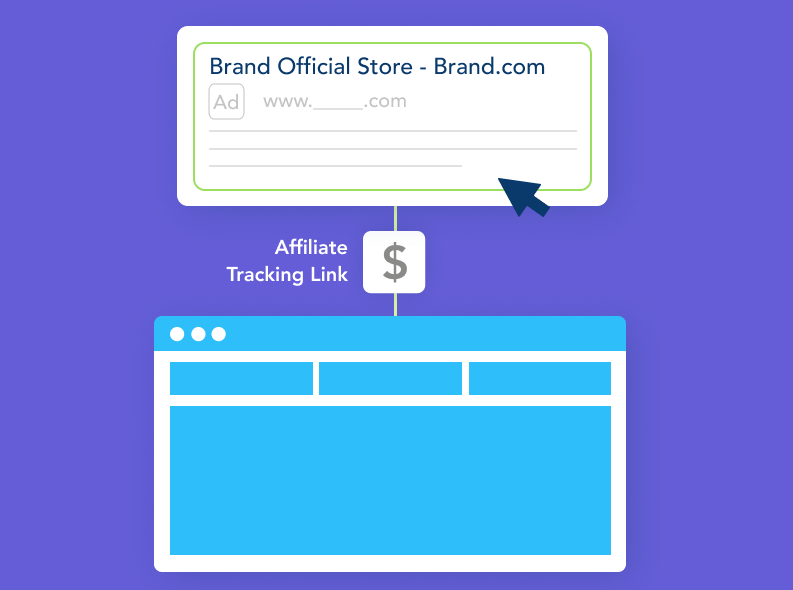Intro: Get to grips with PPC brand protection
The strongest paid search strategy builds on your brand’s unique value. Here, you control the customer experience and messaging, driving traffic that converts in search via Google Ads. Your brand terms, message, and unique selling points are yours to leverage – and in paid search, they should be your safe haven.
But with competition fierce, protecting your brand in paid search is crucial. Let’s unlock the secrets of PPC brand protection, safeguarding your reputation and optimizing your campaigns for success.
What is brand bidding and why is it crucial for businesses?
Let’s start with the basics. What is brand bidding? Simply put, brand bidding is the process of bidding on specific brand-related keywords to gain greater visibility on the search engine results pages (SERP) of search engines such as Google.
Here’s the twist: brand bidding isn’t just about promoting yourself. Businesses can also bid on their competitors’ brand names to grab attention and potentially win over interested customers. Done right, this can lead to a surge in website traffic, leads, and ultimately, sales.
Legal considerations and implications of using brand trademarks
Legal and trademark rules, particularly regarding brand bidding on search engines, involve a combination of general trademark laws and search engine policies. Here’s a breakdown:
General trademark laws:
- Trademark protection: Trademarks are protected intellectual property that grant exclusive rights to use a particular mark (e.g a brand name, logo, slogan) in commerce. This protection extends to preventing others from using similar marks that could cause consumer confusion.
- Infringement: This refers to the unauthorized use of a trademark in a way that causes confusion or dilutes the brand’s distinctiveness.
- Enforcement: Trademark owners have the right to enforce their marks and take legal action against infringers
Search engine policies:
- Brand bidding policies: Search engines like Google have policies governing the use of trademarks in advertising, including brand bidding. These policies aim to prevent advertisers from bidding on trademarked terms they don’t own.
- AdWords policies: Google’s AdWords policies typically restrict advertisers from using trademarked terms in ad text unless they have explicit permission from the trademark owner. However, bidding on trademarked terms as keywords may be allowed in certain circumstances, such as when the ad doesn’t use the trademark in the ad text and when the landing page provides relevant information about the trademarked product or service.
- Quality Score impact: Advertisers bidding on trademarked terms may experience lower Quality Scores and higher costs per clicks (CPCs) if their ads are deemed less relevant due to trademark restrictions.
Impact on brand bidding:
- Permission requirements: In some cases, advertisers may need explicit permission from the trademark owner to bid on their branded terms.
- Competitive landscape: Brand bidding allows competitors to target a brand’s audience directly, potentially diverting traffic and customers away from the brand’s own ads.
- Legal risks: Bidding on trademarked terms without permission can lead to legal action for trademark infringement.
- Strategic considerations: Despite restrictions, brand bidding can still be a valuable strategy for advertisers looking to capture market share or compete more effectively in search engine results pages.
Overall, navigating trademark laws and search engine policies requires careful consideration to ensure compliance and protect brand interests while maximizing advertising effectiveness.
What is PPC brand protection?
Your brand deserves to be in control. But in the fast-paced world of paid search, competitors, resellers, and even affiliates can exploit your brand for their own gain. How?
Keyword Bidding: They might bid on your brand terms, causing your ads to drop in search results.
Trademark Misuse: They could use your brand name or trademarks in their ads, misleading customers, and diverting traffic.
PPC brand protection is your shield. It safeguards your online presence and reputation by keeping your brand front and center in search engines, protecting hard-earned brand equity, and ensures your customers find you first.
Strategies for effective brand protection in search
Protect your brand from ad hijacking
Affiliate ad hijacking is the process of affiliates creating fake ads that look like yours, using your brand name, and targeting relevant search queries. Traffic is funnelled to your website using UTM parameters, giving them credit for the sale, even though the customer landed on your site. This way, they steal commissions that aren’t rightfully theirs.
What are the risks of affiliate ad hijacking?
Ad hijacking in paid search can be a real headache for businesses, leading to several risks and consequences:
- Wasted ad spend: Hijackers might outbid you on your own brand keywords, forcing you to pay more just to appear in search results for your own brand name. This eats away at your budget and reduces the effectiveness of your campaigns.
- Lost traffic and sales: If hijackers’ ads are displayed instead of yours, potential customers could be directed to the wrong website. This means lost traffic, leads, and ultimately, sales.
- Brand damage and confusion: Hijackers might use misleading ad copy or even impersonate your brand entirely. This can confuse customers and damage your brand reputation.
- Channel conflict: If unauthorized affiliates are hijacking your brand terms, it can create conflict with your other marketing channels. Customers might get mixed messages or have a negative experience, hindering your overall marketing efforts.
- Reduced click-through rates (CTR): Even if your ads appear, hijackers might use tactics that make their ads more appealing, leading to a lower click-through rate for your legitimate ads.
- Erosion of brand trust: Repeated exposure to hijacked ads can make customers wary of clicking on your ads in the future, impacting brand trust.
Strategies to protect your brand from ad hijacking
Set boundaries
Agree to codes of conduct that specify what terms your partners can use and how you want your brand to be represented. Include search terms you don’t want to be associated with and consider alternative terms of value to whitelist so you’re not competing for the same clicks.
Prove it and don’t over pay
Make sure you’re only paying for traffic that you wouldn’t win otherwise. Capture evidence to enforce your contractual terms.
Use Adthena’s Ad Hijacker Detection solution
Monitor and report thousands of instances of affiliate ad hijacks across hundreds of affiliate networks. Automatically detect when an affiliate impersonates your ad and get evidence of fraud including ad screenshot and affiliate ID.
Take a tour of Adthena’s Ad Hijacker Detection
Protect your brand from trademark infringements in paid search
Trademark infringement in paid search happens when a competitor or another advertiser uses your legally protected trademarks in a way that’s likely to confuse customers about the source of a product or service. Here’s a breakdown of the key points:
- Trademarks: These are unique words, symbols, or phrases that identify the source of your goods or services. They help distinguish your brand from competitors.
- Using Your Trademark: In paid search, infringement can occur when someone uses your trademark in several ways…
Bidding on your brand terms: This involves using your brand name or related keywords in their ad campaigns. While some platforms allow bidding on competitor terms, the focus shouldn’t be on misleading customers.
Trademark in ad copy: They might directly include your trademark within the ad text itself, creating the impression that their product or service is affiliated with yours.
It’s important to note that the laws around trademark infringement can vary depending on your location. However, most search engine platforms have policies in place to prevent advertisers from misleading users through trademark misuse.
What are the risks of trademark infringement in paid search?
Infringement carries significant risks for both the infringer and the brand whose trademark is being misused:
- Legal trouble: Trademark infringement is a serious offence. If another advertiser misuses your trademark and you take legal action, they could face significant financial penalties and be forced to stop using your trademark.
- Brand damage: Confusion caused by trademark infringement can erode your brand reputation. Customers who click on a misleading ad might feel frustrated or deceived, potentially damaging your brand trust.
- Wasted resources: If customers are directed to a competitor’s site due to trademark infringement, you lose valuable leads and potential sales. This can negatively impact your marketing ROI.
- Account suspension: Most search engine platforms have strict policies against trademark infringement. If you’re found to be infringing on another brand’s trademark, your ad account could be suspended, hindering your online marketing efforts.
- Negative customer perception: Even if you’re not the one infringing, being associated with such tactics can paint a negative picture of your brand to potential customers.
- Reputational hit: Engaging in trademark infringement yourself can seriously damage your brand’s reputation. It can portray you as unethical and untrustworthy.
Strategies to protect your brand from trademark infringement
Don’t get sucked into bidding wars on your own search terms. The most effective long-term strategy against competitors infringing on your brand is to harness the power of search intelligence to understand their Google Ads strategies on a granular and continual basis. Then you can take action.
Monitor bids and infringements on your branded search terms
Adthena’s Infringement Tracker allows you to monitor bids and infringements on your branded search terms on a vast scale. Around the clock, we provide a complete AI-powered map of all brand bids and infringements in your competitive search universe.
With Adthena’s Infringement Tracker, you can:
Make informed budget decisions on your brand terms.
Proactively monitor your entire digital brand landscape.
Prevent partners and affiliates from cannibalizing clicks.
Spot infringements and protect your brand value.
Take a tour of Adthena’s Infringement Tracker
Map and monitor competitive and partner activity around your brand terms
Search marketers experience many challenges when it comes to controlling the use of their trademarks. The two themes we hear most?
“Trying to control the use of trademarks is tedious and time-consuming.” and “Finding real-life trademark infringement examples is too difficult to do manually.”
It can take up to eight hours each month to manually collect and process the trademark violation data required to submit Google complaints properly. By automating aggregation and submission of infringements across devices at scale, you can confidently protect your brand and save time and effort.
Take control with Adthena’s Auto Takedown
Auto Takedown is an Adthena feature that allows you to map and monitor all competitive and partner activity around your brand terms, meaning you can efficiently respond to trademark infringements and report those examples directly to Google for removal. All with the simple push of a button.
Automatically monitor your brand trademark search terms at scale, 24/7.
Automatically submit evidence of trademark violations directly to Google. Adthena will also keep track of the responses from Google.
Save up to eight hours per month in manual monitoring
Adthena helps us objectively quantify and validate just how competitive our market is and when our position is at risk. That insight has been vital to securing stakeholder support to adequately fund paid media budgets and stay on top of our market.

Shazia Kermally
Regional Paid Media Manager UK & Ireland
Sage

Read their story
Conclusion: Safeguard your brand and dominate search
In the competitive world of paid search, protecting your brand is essential. By taking proactive measures, you can prevent imposters from hijacking your clicks and reputation.
This guide has equipped you with the knowledge to:
- Safeguard your brand from affiliate ad-hijacking: Establish clear boundaries with affiliates, monitor for suspicious activity, and leverage tools to detect and report infringements.
- Combat trademark infringement: Understand the legalities and risks, and utilize solutions to monitor competitor activity and efficiently report violations to search engines.
The benefits of a robust brand protection strategy are undeniable:
- Increased control over your brand presence: Your ads will appear more prominently, attracting qualified leads and driving conversions.
- Enhanced brand reputation: Customers won’t be misled by imposters, fostering trust and loyalty.
- Improved campaign performance: Reduced wasted ad spend and a higher ROI on your paid search efforts.
Remember: Brand protection is an ongoing process. By diligently monitoring key metrics, adapting your strategy, and prioritizing prevention, you can ensure your brand remains the dominant force in search results.
Take action today! Explore the solutions mentioned throughout this guide to safeguard your brand and maximize the success of your paid search campaigns.

Measure the success of your brand protection strategy
Now that you’ve implemented your brand protection strategy, it’s crucial to track its effectiveness. Here’s how to measure the success of your efforts and ensure your brand remains king of the search results castle.
Reduced trademark infringement:
- Manual reviews: Regularly monitor search results for your brand terms to identify instances of competitors or affiliates potentially infringing on your trademarks in their ad copy. The decrease in such occurrences over time indicates a successful brand protection strategy.
- Alert systems: Utilize tools such as Adthena’s Infringement Tracker that can automatically detect and notify you of potential trademark infringements in paid ads. A decrease in alerts suggests your efforts are working.
Metrics showing increase control:
- Brand Search Share: As your brand protection efforts take hold, you should see an increase in your brand search share. This means your ads are appearing more frequently when users search for your brand terms, pushing out potential hijackers.
- CTR for brand terms: A healthy and stable CTR for your brand terms suggests users are clicking on your legitimate ads and not being misled by imposters.
- CPC for brand terms: Ideally, as your brand protection strategy improves, your CPC for brand terms should decrease. This is because you’re facing less competition from hijackers driving up the cost of bidding on your own keywords.
Indirect brand protection benefits:
- Increased brand awareness: A successful brand protection strategy can lead to a more positive brand image online. This, in turn, can contribute to increased brand awareness through organic search and word-of-mouth marketing.
- Improved conversion rates: By preventing users from being directed to fake websites by hijackers, your brand protection efforts can lead to a higher conversion rate for your paid search campaigns.
Important considerations:
- Data integration: Combine data from your search engine platform with website analytics to get a holistic view of user behavior and identify any discrepancies that might indicate hijacking.
- Long-term monitoring: Brand protection is an ongoing process. Regularly monitor key metrics and adapt your strategy as needed to stay ahead of potential threats.
- Focus on prevention: While measuring legal actions can be a metric, a truly successful strategy focuses on preventing infringements in the first place.
By tracking these metrics and focusing on both preventative and reactive measures, you can effectively gauge the success of your brand protection strategy in paid search and ensure your brand maintains control over its online presence.










